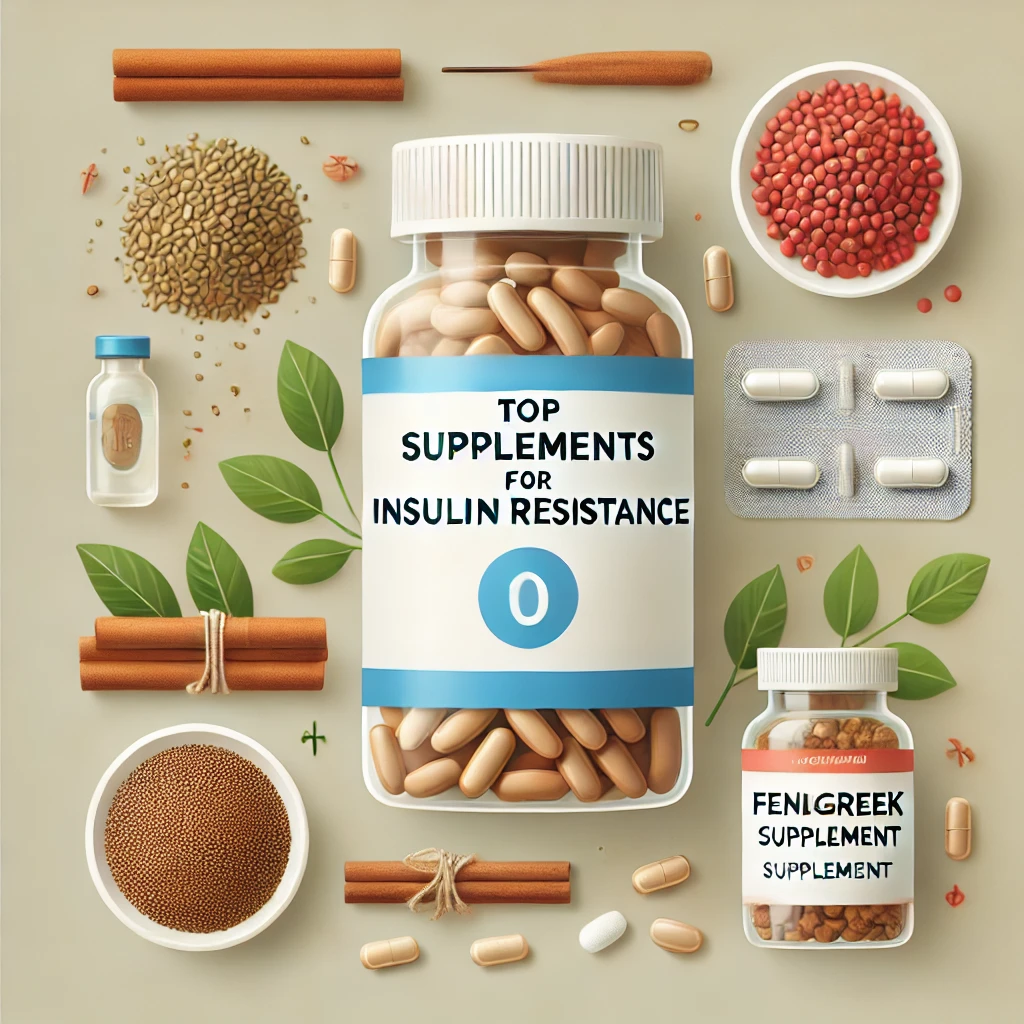
Insulin resistance can make it challenging to manage blood sugar and achieve weight loss. Fortunately, certain supplements can improve insulin sensitivity and support better glucose management. In this guide, we’ll cover the most effective supplements for addressing insulin resistance and how they work to enhance insulin function.
1. Berberine
What it is: A natural compound found in plants like Goldenseal and Barberry. How it helps:
- Berberine activates AMPK (adenosine monophosphate-activated protein kinase), an enzyme known as the “metabolic master switch.” This enzyme improves glucose metabolism and increases insulin sensitivity.
- Studies have shown that berberine can reduce fasting blood sugar, improve insulin response, and lower HbA1c levels.
- It can also enhance gut health, which plays a role in regulating glucose metabolism.
2. Chromium
What it is: An essential trace mineral found in foods like broccoli, green beans, and whole grains. How it helps:
- Chromium improves insulin sensitivity by enhancing its activity, making it easier for cells to absorb glucose.
- Research shows that chromium supplementation can lower blood sugar, improve insulin response, and reduce HbA1c in people with insulin resistance or type 2 diabetes.
3. Alpha Lipoic Acid (ALA)
What it is: A powerful antioxidant found in foods like spinach, broccoli, and potatoes. How it helps:
- ALA improves glucose uptake in cells, making it easier for the body to manage insulin levels.
- It reduces oxidative stress and inflammation, which are common in people with insulin resistance.
- Several studies have found that ALA supplementation can enhance insulin sensitivity and improve overall glucose metabolism.
4. Magnesium
What it is: A vital mineral involved in over 300 biochemical reactions in the body. How it helps:
- Magnesium is essential for insulin function, as it helps insulin receptors on cells work effectively.
- Low magnesium levels are linked to insulin resistance, making supplementation beneficial.
- Studies suggest that magnesium supplementation can improve insulin sensitivity, reduce fasting blood sugar, and lower HbA1c levels.
5. Inositol
What it is: A type of sugar alcohol found in fruits, beans, and grains. How it helps:
- Inositol, especially in the form of myo-inositol and D-chiro-inositol, can improve insulin sensitivity and help regulate blood sugar levels.
- It is particularly beneficial for women with PCOS (Polycystic Ovary Syndrome), who often experience insulin resistance as a symptom.
- Inositol has been shown to improve glucose uptake, reduce insulin levels, and balance hormones.
6. Cinnamon Bark Extract
What it is: A popular spice derived from the bark of the Cinnamomum tree. How it helps:
- Cinnamon mimics insulin, making it easier for glucose to enter cells and be used for energy.
- It slows carbohydrate digestion, reducing blood sugar spikes after meals.
- Research indicates that cinnamon can improve insulin sensitivity, lower fasting blood sugar, and reduce HbA1c levels.
7. Fenugreek
What it is: A plant whose seeds are often used in cooking and traditional medicine. How it helps:
- Fenugreek contains soluble fiber, which slows down glucose absorption in the intestines.
- It improves insulin sensitivity, making it easier for cells to respond to insulin.
- Studies have found that fenugreek supplementation can lower fasting blood sugar and improve overall glucose metabolism.
8. Vitamin D
What it is: A fat-soluble vitamin found in foods like fatty fish, eggs, and fortified milk. How it helps:
- Vitamin D is essential for insulin production and function. Deficiency in vitamin D has been linked to increased risk of insulin resistance.
- Supplementing with vitamin D can improve insulin sensitivity and help balance glucose levels.
- Studies show that vitamin D supplementation can reduce fasting blood sugar and enhance insulin function.
Tips for Using Supplements for Insulin Resistance
- Consult Your Doctor: Always check with your healthcare provider before adding new supplements, especially if you are on diabetes medication.
- Combine with Lifestyle Changes: While supplements can help improve insulin sensitivity, they work best when combined with a healthy diet, regular exercise, and stress management.
- Stay Consistent: Consistent use of supplements, along with regular monitoring of blood sugar levels, is key to achieving better insulin sensitivity.
Related Articles for Further Reading
- How Gluco6 Manages Blood Sugar Without Medications
- Top Natural Supplements for Managing Blood Sugar
- How Glucotrust Helps Control Blood Sugar Naturally
Improving insulin sensitivity is crucial for managing blood sugar and reducing the risk of type 2 diabetes. By incorporating supplements like berberine, chromium, and ALA into your routine, you can enhance your body’s insulin response and achieve better glucose control naturally.
